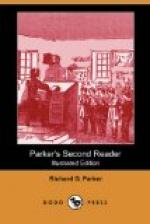LESSON VI.
The Author to the Pupil.
1. In the first lesson, I told you that I would show you how to understand what is in this book; and how you may, with very little assistance from your teacher, be able to read all the hard words that you find in any book.
2. Many little boys and girls are very fond of running out of their places in school, and going up to their teachers with a great many unnecessary questions. This always troubles the teacher, and prevents his going through with all his business in time to dismiss you at the usual hour.
3. Whenever you meet with any real difficulty, that you cannot overcome yourself without his assistance, you should watch for an opportunity when he is at leisure, and endeavor to attract his attention quietly, and without noise and bustle, so that your fellow-pupils may not be disturbed, and then respectfully and modestly ask him to assist you.
4. But if you are noisy and troublesome, and run up to him frequently with questions that, with a little thought, you could easily answer yourself, he will not be pleased with you, but will think that you wish to make trouble; and, perhaps, will appear unkind to you.
5. I will now endeavor to show you how you may understand what is in your book, so that you will have no need to be troublesome to your teacher.
6. In the first place, then, always endeavor to understand every line that you read; try to find out what it means, and, if there is any word that you have never seen or heard of before, look out the word in a dictionary, and see what the meaning of the word is; and then read the line over again, and see whether you can tell what the whole line means, when you have found out the meaning of the strange word.
7. Now, as you can understand everything best when you have an example, I will give you one, as follows. In the tenth chapter of the Acts of the Apostles, at the first verse, there are these words:
1. “There
was a certain man in Cesarea, called
Cornelius, a centurion
of the band called the Italian
band,
2. “A devout
man, and one that feared God with all his
house, and gave much
alms to the people, and prayed to
God always.”
8. I suppose you know what most of the words in these verses mean, except the word centurion in the first verse, and the word alms in the second.
9. Now, if you look for the word centurion in the dictionary, it will tell you that centurion means a military officer, who commanded a hundred men. Thus you find that Cornelius was a soldier; and not only that he was a soldier, but that he was an officer, that commanded soldiers.
10. Again, if you look for the word alms in your dictionary, you will find that it means money given to the poor; and thus you find that Cornelius was a very good man, and not only prayed to God, but also gave much money to assist the poor.




